
Film Review | Avengers: Endgame
Producers: Marvel Studios, Walt Disney Pictures
Runtime: 181 minutes
MPAA Rating: PG-13
EE Critic Score: 8/10
Avengers: Endgame is the twenty-second film in the Marvel Cinematic Universe, the fourth film in the Avengers franchise, and the finale of what I’ve seen lately called “The Infinity Saga”, which comprises many, but not all, MCU films.
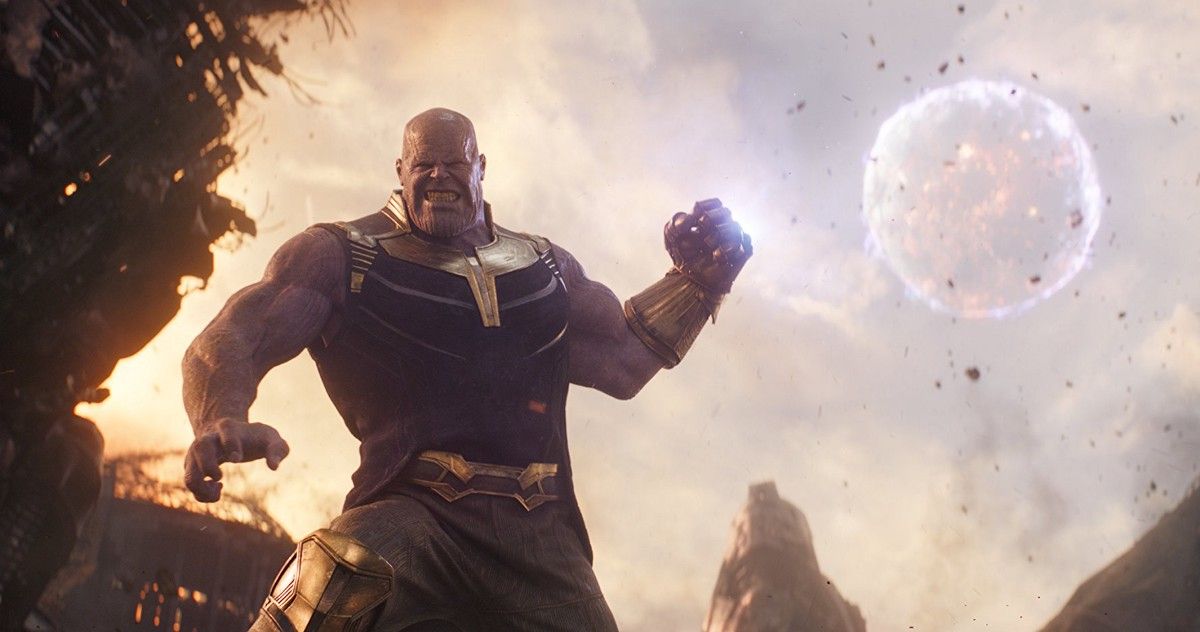
Endgame is, most immediately, the sequel to last year’s Avengers: Infinity War, of which I said:
…it is the first half of a story, which won’t be continued until next year. I can’t enjoy watching the first half of something unless I have the second half to follow it up with. But I have to wait, which means I have to wait to review the story until then. For now, I give Avengers: Infinity War an incomplete.
So, yeah, it’s been a year, and I’ve seen the rest of the story, now. And it’s time to review it properly.
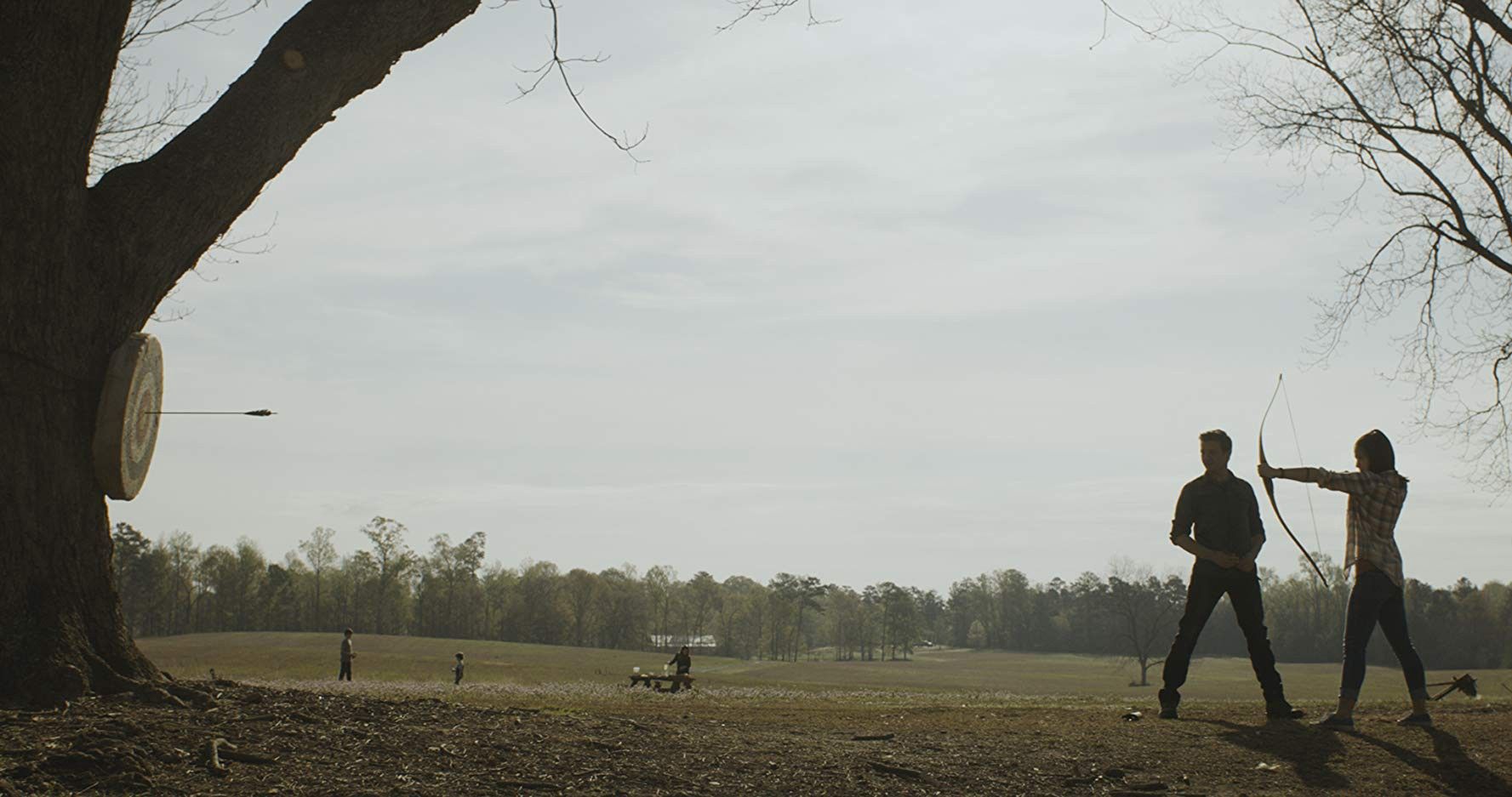
Synopsis
The film opens abruptly, without a title or studio logos preceding its first scene, wherein Clint Barton (Jeremy Renner) is enjoying a picnic with his family. Barton had been a SHIELD agent and a member of the Avengers, the team who had defended the Earth from numerous attackers, both celestial and terrestrial in origin, until SHIELD was revealed to be compromised and the Avengers broke up over disagreements between team leader Steve Rogers (Chris Evans) and team funder Tony Stark (Robert Downey, Jr.). Barton had sided with Rogers, while the U.S. Government sided with Stark. After taking up arms against Stark and the sanctioned Avengers team, Barton has been placed under house arrest.
In spite of all this, Barton seems to be doing well, teaching his daughter how to be an archer like himself. Then, just as they are sitting down to eat, his family fades away into dust, leaving Barton alone and confused.
Viewers of Avengers: Infinity War will know what has happened. Thanos (Josh Brolin), an alien warlord, has, despite the best efforts of many of the other Avengers and several other allies, succeeded in using the combined power of the Infinity Stones to wipe out half the life in the universe, saving the other half, by his reckoning, from poverty and war.
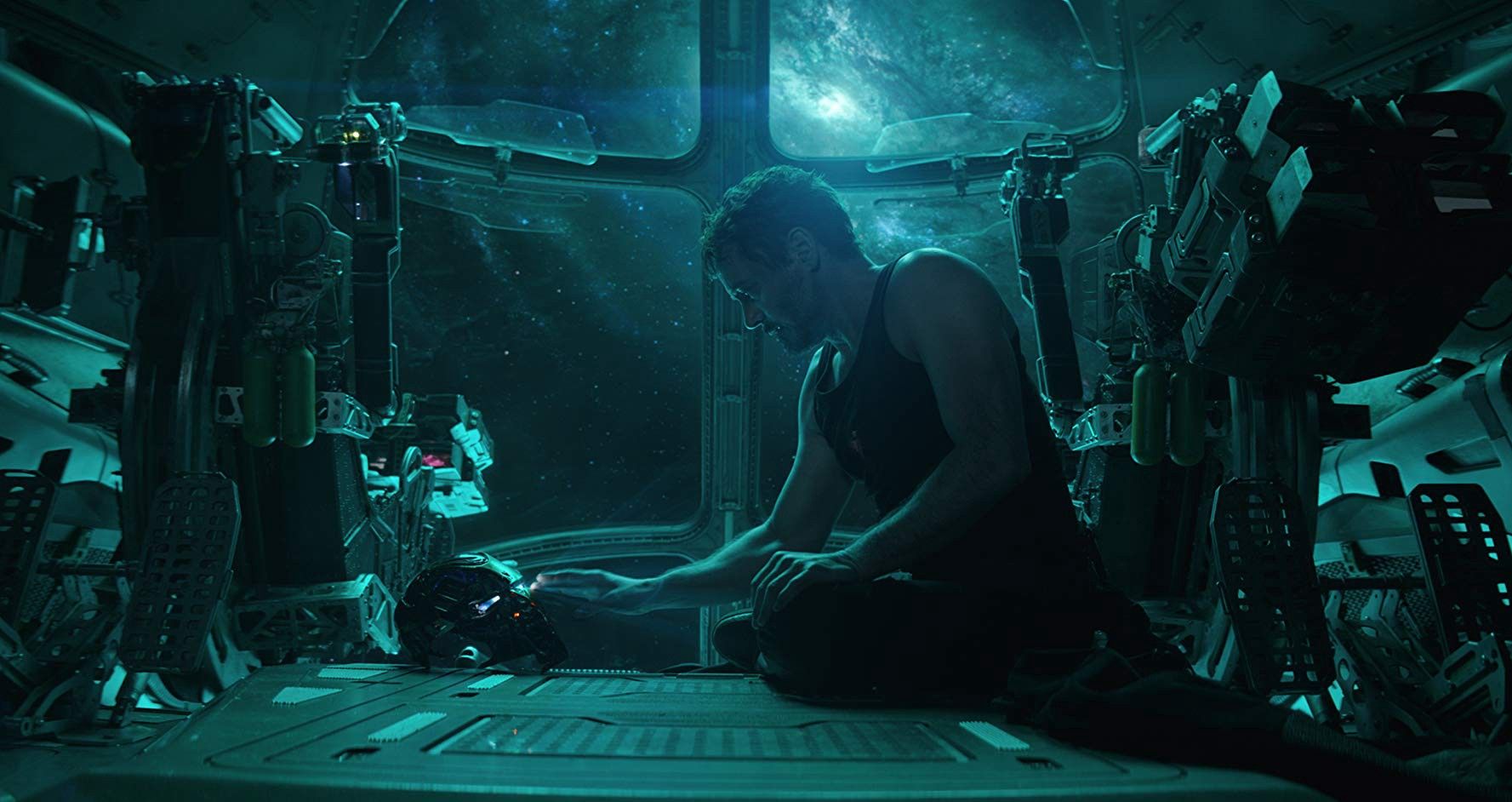
Carol Danvers (Brie Larson) is recalled to Earth by Nick Fury, just before he is himself dusted. Learning what has happened, she rescues Tony Stark, who, after a failed attack on Thanos, has been left adrift in space with Nebula (Karen Gillan), one of Thanos’s adopted children who had turned against him and had been working with the rag-tag band of heroes The Guardians of the Galaxy, most of whom had been dusted. Stark, upon returning to Earth, lashes out at Rogers, whom Stark believes had abandoned his post as Earth’s defender.
With Nebula’s help, the surviving Avengers track Thanos down to the simple farm he had, Cincinnatus-like, retired to following his victory. They find that Thanos had destroyed the Infinity Stones, to prevent his duocimation from being undone. Thor (Chris Hemsworth) beheads Thanos, avenging the dead, but unable to do anything more.
The narrative of the film jumps ahead by five years. Natasha Romanoff (Scarlett Johansson) leads what remains of the Avengers: Steve Rogers and James Rhodes (Don Cheadle) on Earth, and Carol Danvers, Nebula, and Rocket Racoon (Bradley Cooper) in space. Clint Barton has become a vigilante, killing organized crime members around the globe, retaliating against those he doesn’t believe deserve to live after so many innocent people had died. Tony Stark has retired from the hero game, and now lives in a lakeside cabin with his wife, Pepper Potts (Gwenyth Paltrow), and their young daughter Morgan (Lexi Rabe). Bruce Banner (Mark Ruffalo) has also retired, having reconciled with his alter-ego the Hulk, and now taking a hybrid form with Banner’s powerful mind in the Hulk’s powerful body.
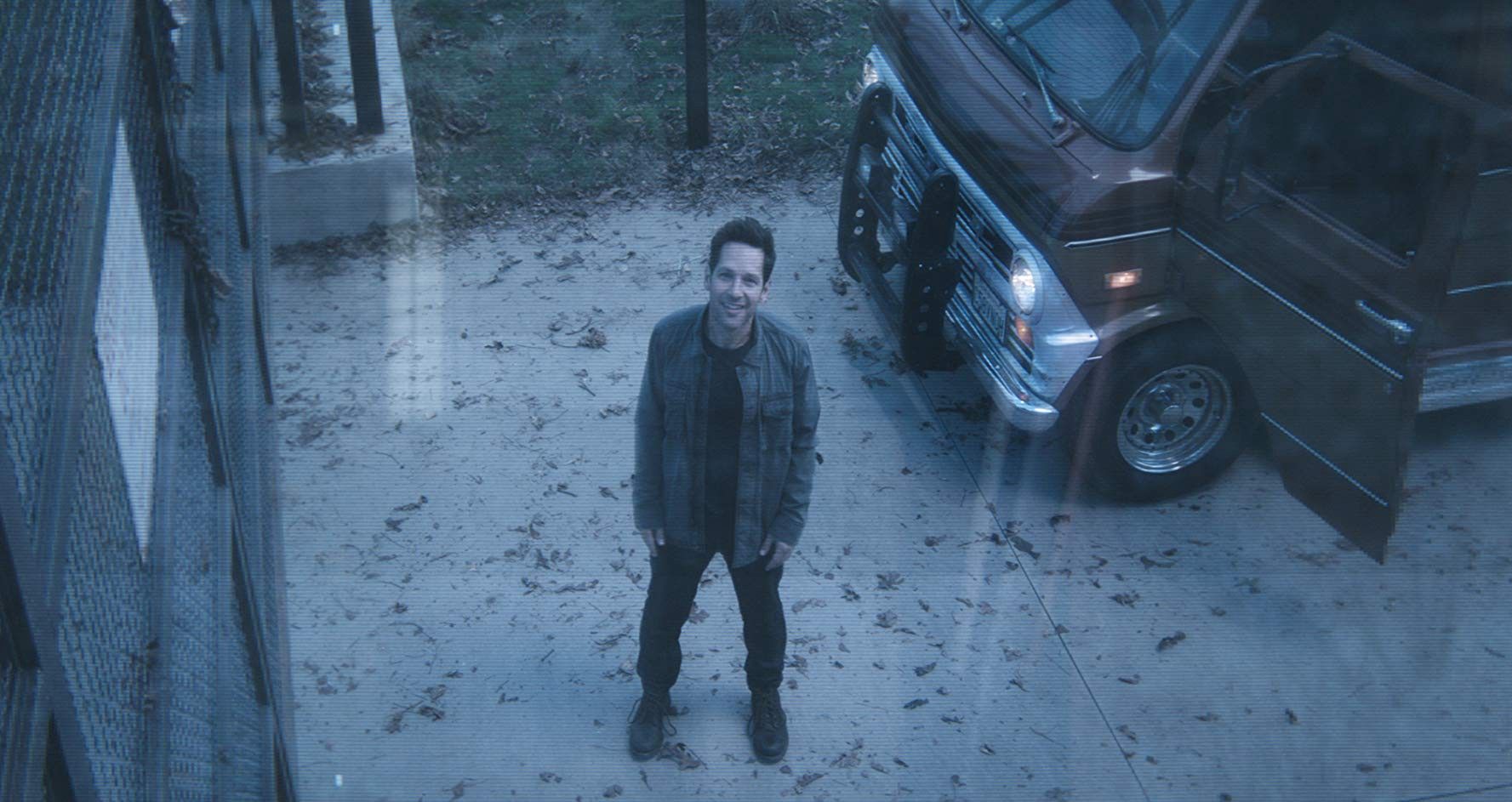
In a storage facility holding the abandoned belongings of San Francisco’s dusted population, a rat scurries over the control panel of the quantum realm portal seen in the post-credits scene of Ant-Man and the Wasp, triggering the mechanism and retrieving Scott Lang (Paul Rudd) from the microscopic underpinnings of the universe. Unaware of Thanos, Lang wanders the city confused. He discovers a memorial to the victims of whatever catastrophe had occurred, and, while searching in dread for his daughter’s name, finds his own. He returns to his home to find his daughter, Cassie (Emma Fuhrmann) five years older than when he had last seen her, though he had only been in the quantum realm for a matter of hours.
The time discrepancy sticks in Lang’s mind, until, eventually, he travels to the Avengers Headquarters, where he proposes that the quantum tunneling technology could be used as a time machine, allowing them to have a second chance to defeat Thanos. Lang and the Avengers first visit Stark, who refuses to risk the life he’d built for himself since Thanos on a plan that he doubts will work. Bruce Banner is more willing to help, though his prototype machine fails to send Lang through time, rather “sending time through Lang”, as he puts it. Lang is made a teenager, an old man, and an infant before Banner manages to correct his age.

Remembering his protege Peter Parker (Tom Holland), one of Thanos’s victims, Stark comes around to help with the time travel project. He and Banner manage to get a working device, and the Avengers seek out their other former members to join in the mission.
Romanoff finds Barton in Japan, fighting the Yakuza, while Banner and Rocket Racoon find Thor, drunk and idle, and severely depressed, in the coastal town of New Asgard. Leadership of the Asgardians has fallen to Valkyrie (Tessa Thompson), as Thor spends his days growing fat and playing video games, trying to forget how his miscalculated blow to Thanos’s chest at the Battle of Wakanda had allowed the Mad Titan his victory.
Banner develops a plan to use the time machine not to stop Thanos, as Lang had proposed, but to retrieve the Infinity Stones to be used in the present to undo the duocimation. This is to prevent temporal paradoxes from making it such that, without Thanos’s victory at Wakanda, the time machine had never been built, the plan never put into action, Thanos winning at Wakanda again, ad astera. By performing their actions in the present, they will leave the instigating actions for their mission intact.
They split into four groups. Rocket Racoon and Thor travel to Asgard just before the attack by the Dark Elves, to retrieve the Reality Stone, which was, at that time, bonded to Jane Foster (Natalie Portman, appearing in archive footage from Thor: The Dark World). Rocket retrieves the stone while Thor is distracted by an encounter with his mother Frigga (Rene Russo), who had died the day they had returned to. Frigga, who has precognitive abilities, recognizes that Thor is not the Thor she knows, but his future self. She gives him counsel and helps him recommit himself to his duties as a hero. Rocket and Thor then return to their home time, Thor retrieving his, at that point still intact, hammer Mjolnir at the last minute beforehand.
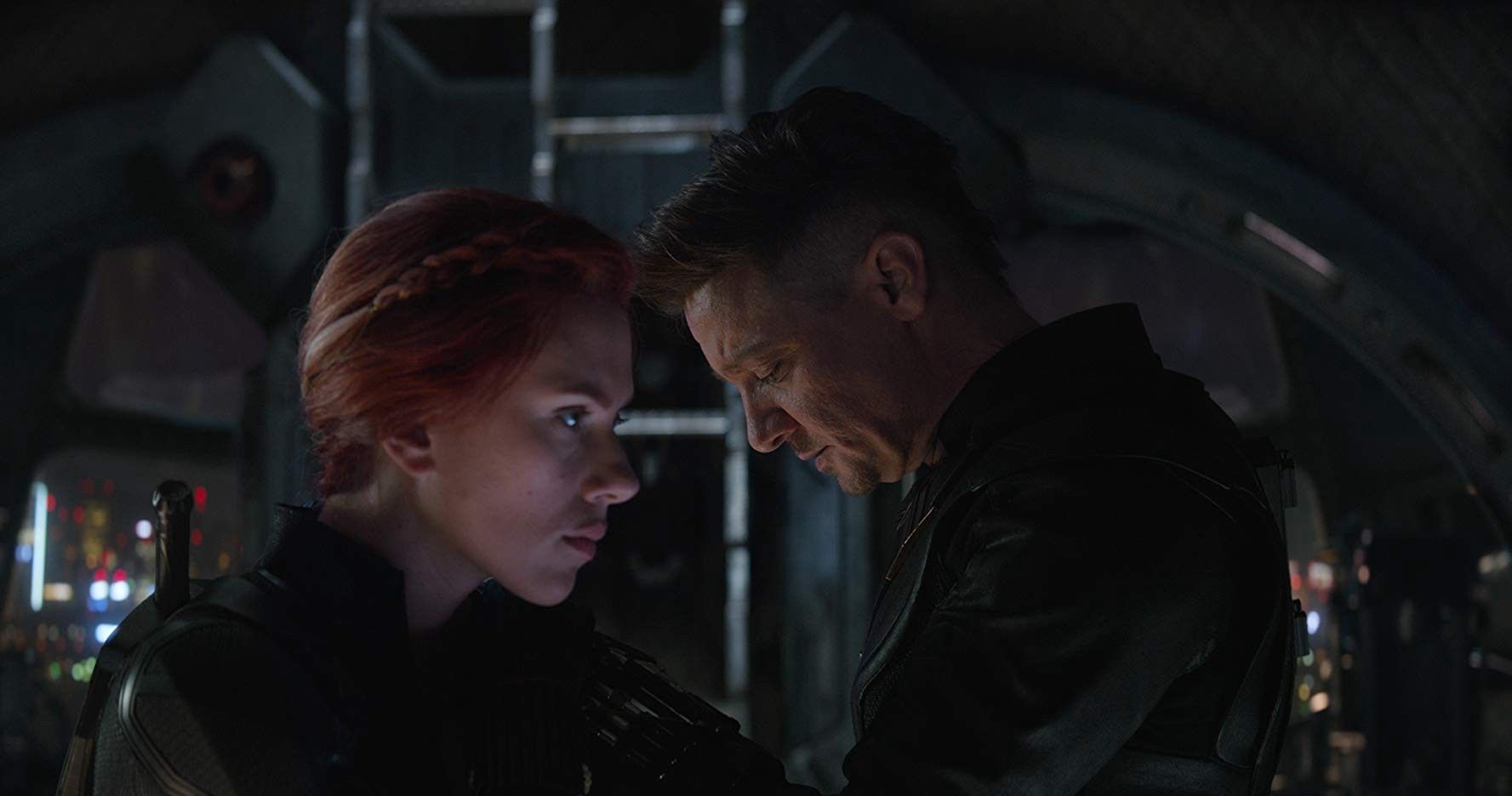
Romanoff and Barton travel to the temple on Vormir, to retrieve the Soul Stone. As he had to Thanos, the enslaved spirit of Johann Schmitt, the Red Skull (Ross Marquand) appears to say that the Soul Stone demands a soul of a loved one in return for its possession. Romanoff and Barton each insist that the other sacrifice them for the Stone, and the two grapple with each other. In the end, Romanoff manages to throw herself from the heights of the temple. Barton is given the Soul Stone, and returns to his home time.
Lang, Banner, Stark, and Rogers travel to New York City, as it is being besieged by Loki (Tom Hiddleston) as depicted in The Avengers. Here they hope to find the Space Stone (contained within the Tesseract Loki had been commissioned to steal from SHIELD), the Mind Stone (contained within Loki’s scepter), and the Time Stone (contained within the Eye of Agamotto pendant) all in one general location.
Stark and Lang work together to get the Tesseract, with Lang making himself small and infiltrating a post-battle meeting between the past era’s Stark, Rogers, and Thor and World Security Council Secretary Alexander Pierce (Robert Redford). Thor is arguing for Loki to be taken into Asgardian custody, along with the Tesseract, while Pierce (secretly a HYDRA leader, as our time-travelling heroes know now but did not know at the time) wishes they be turned over to SHIELD. Lang provides a distraction by crawling into past-Stark’s artificial heart and pulling a wire, putting past-Stark into cardiac arrest. The arrival of a rampaging Hulk botches the attempt to retrieve the Tesseract, which gets knocked into Loki’s hands. Loki escapes using the Space Stone’s powers.
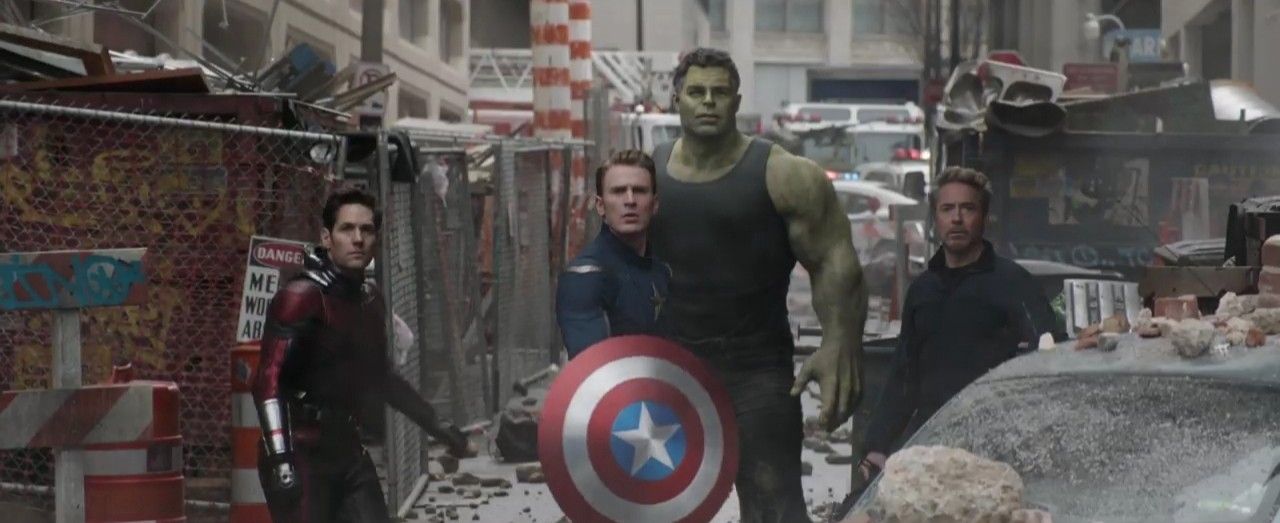
Banner travels to the Sanctum Sanctorum, in Greenwich Village, searching for Dr. Steven Strange (Benedict Cumberbatch) and the Time Stone. Instead of Strange, he finds The Ancient One (Tilda Swinton), who tells him that Strange is not yet a sorcerer, and is still a surgeon in the hospital elsewhere in the city. She does have the Time Stone, though she is initially reluctant to give it up. Without the Time Stone, Strange will not be able to later stop Dormammu from destroying reality. Banner promises that the Avengers will return the Stones to their right places in history after they use them to undo Thanos’s duocimation, and the Ancient One agrees to give him the Time Stone.
Rogers completes his task the most easily, intercepting the Scepter as it is being carried by Jasper Sitwell (Maximiliano Hernandez) and the STRIKE team, who are there working for Pierce. Rogers tells them that Pierce has sent him to secure the Scepter against an impending theft, professing allegiance to HYDRA. Sitwell turns the Scepter over without incident. As he leaves, Rogers encounters his past self, who takes him to be Loki in disguise. The two Captain Americas fight, with past-Rogers ultimately losing.
The four Avengers reunite, and Stark and Lang admit that they failed their mission. They have only enough Pym particles to make one more trip to the Quantum Realm each, meant to be the trip home.
Stark and Rogers send Banner and Lang back to their right time with the two successfully recovered Stones, while they go back further, to the 1970s on a SHIELD base where the Tesseract had been stored, and where Hank Pym (Michael Douglas) had done his research into size manipulation. Rogers is sent to retrieve some Pym Particles from Pym’s lab, while Stark goes for the Tesseract. They both encounter loved ones: Rogers encounters Peggy Carter (Haley Atwell), though she does not spot him; Stark encounters his father Howard Stark (John Slattery), then a researcher expecting the birth of his first child. They talk, with Howard asking Tony for advice on how to be a good father.
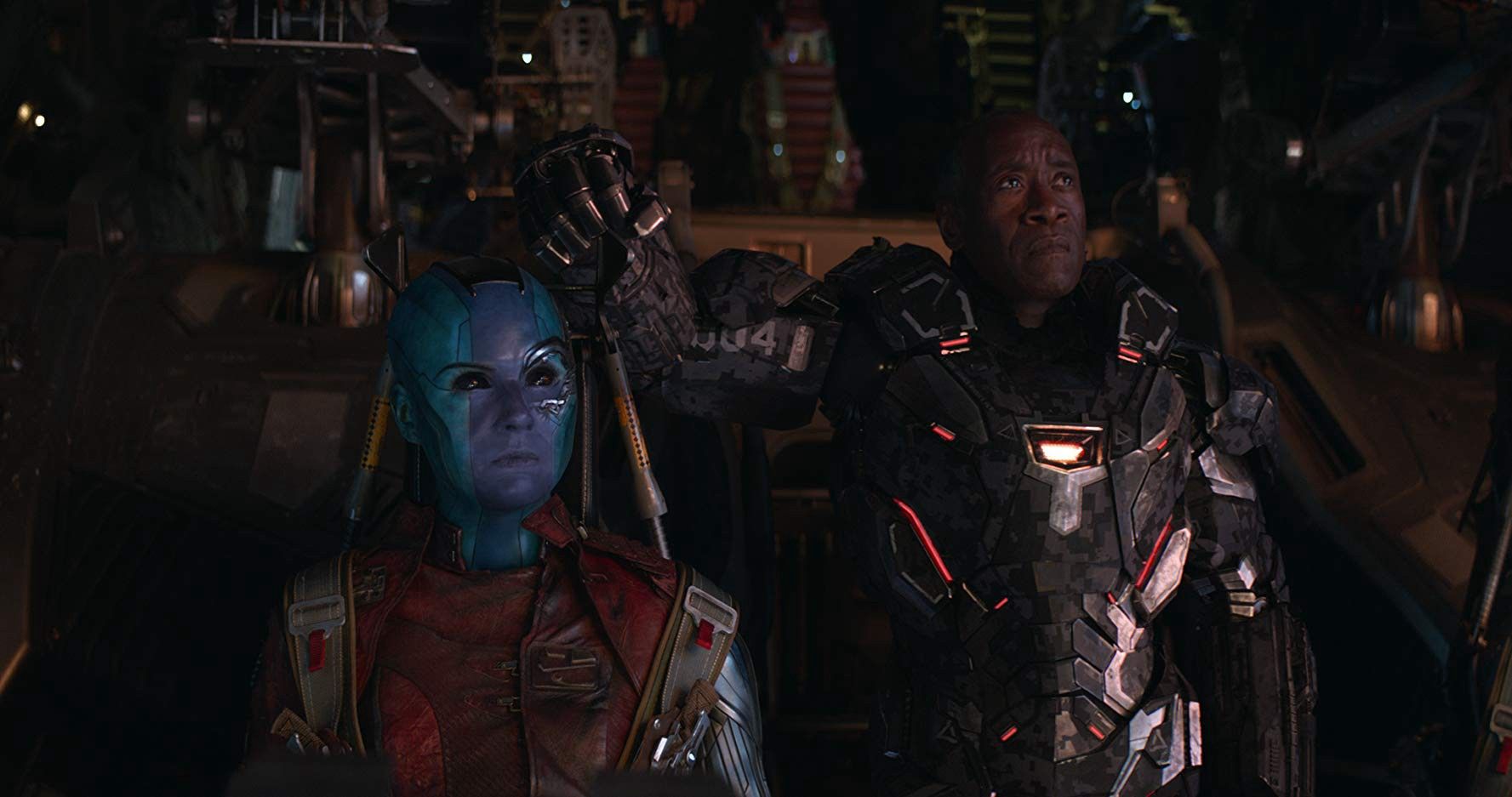
The fourth group, Nebula and Rhodes, travel to the planet Morag, home to the Temple of Power and the Power Stone housed within. After incapacitating a singing Peter Quill (Chris Pratt) who was just arriving to steal the Stone himself, they retrieve it, though Nebula is harmed by the Stone’s defenses.
Thanos discovers them, as the future Nebula and the past Nebula both operate on the same network. He kidnaps the future Nebula, and discovers within her memories the news of his victory, his death, and the plan to undo his life’s work. He sends the loyal past-Nebula back to Rhodes in disguise, keeping future-Nebula captive.
Once they all return to their home time and place, the Avengers get to work crafting a new Infinity Gauntlet, to be wielded by Banner, whose mighty form is the only one able to wield the Stones’ combined power as Thanos did. The effort still seriously burns the arm Banner wore the guantlet on, but the sudden appearance of birds outside the window indicates that the Avenger’s efforts worked.
Past-Nebula summons Thanos and his warship through the time portal, and Thanos’s cannons lay waste to the Avengers Headquarters. Amid the smoking rubble, Barton is the first to recover the new guantlet. He sets out to find the others, but past-Nebula finds him first. As she is about to kill Barton, she is herself killed by future-Nebula, who had broken out of Thanos’s custody with the aid of past-Gamora (Zoe Saldana), who turned on Thanos when Nebula had revealed that Thanos would go on to kill her to retrieve the Soul Stone.
Thanos lands with his armies. He tells the Avengers that, having seen the lengths to which the universe will go to fight against him, even after his death, he now intends to use the Stones to completely destroy the universe and make a new one more inline with his vision, without memory of what was lost.
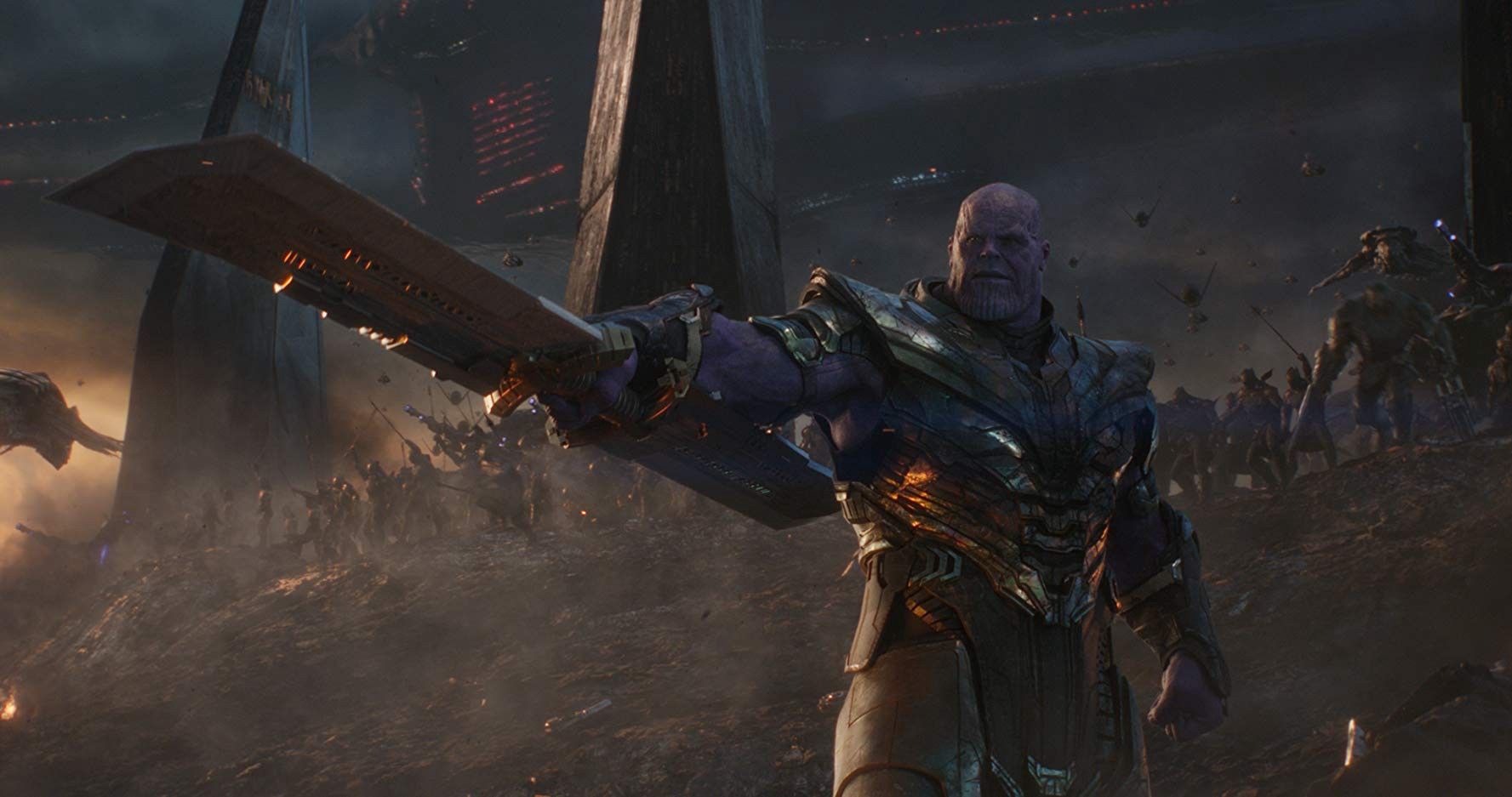
The Avengers stand to fight Thanos, despite the hordes of soldiers backing him up. As the battle is about to begin, Rogers hears a transmission from Sam Wilson (Anthony Mackie), one of the dusted Avengers, telling him to “look to your left”. To Roger’s left opens one of Dr. Strange’s portals, through which comes Wilson, the other dusted Avengers, the dusted Guardians of the Galaxy, the now-armored Pepper Potts, and the armies of Wakanda.
A grand battle ensues, with both sides fighting for possession of the Infinity Gauntlet. Steve Rogers is able to wield Mjolnir, confirming Thor’s suspicions that the supersoldier was among the Worthy. Carol Danvers returns to earth, destroying Thanos’s warship and wresting the gauntlet away from him. Wanda Maximoff (Elizabeth Olson) attacks Thanos in retaliation for his killing her beloved Vision, though he protests that he doesn’t even know who Vision or Maximoff are.
Eventually Thanos gets ahold of the Gauntlet, though Stark is able to surreptitiously steal the stones from it and embed them within the gauntlet of his own armor. With a snap of his fingers, Stark turns Thanos and his armies into dust.
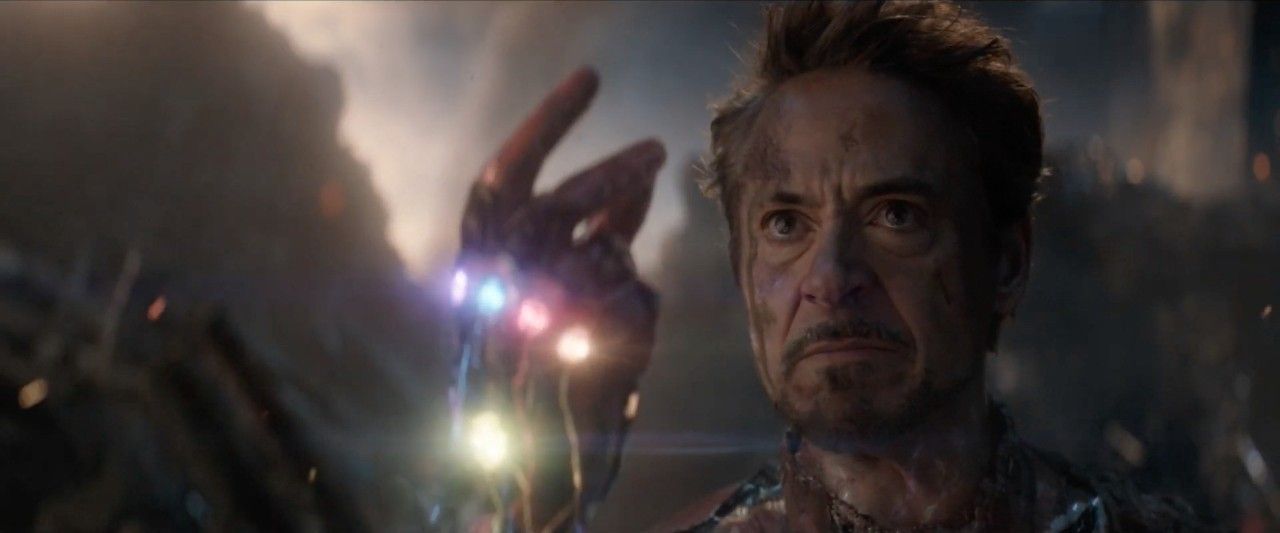
The use of the Stones mortally wounds Stark. Potts arrives at his side, telling him that they won, that the world is safe, and that he can rest now. Stark dies.
A funeral is held for Stark at his lakeside home, attended by the Avengers and their allies. A holographic recording of Stark, which he made to be viewed in the event that something went wrong in his travels through time, is played.f
Afterwards, Steve Rogers embarks through time once again, to return the Infinity Stones and Mjolnir to their proper places. Banner manages the time machine, monitoring Rogers’s travels. As Rogers was supposed to return, he overshoots his target. Banner is trying to determine what went wrong, when Bucky Barnes (Sebastian Stan) spots an old man suddenly appear on a bench beside the lake. Wilson approaches the man, who he recognizes as Rogers.
Rogers had gone back to the ’40s, to keep his date with Peggy Carter, and had stayed in the past with her, living a quiet, happy life. He had returned to Stark’s cabin to pass on his shield and the mantle of Captain America to Wilson.
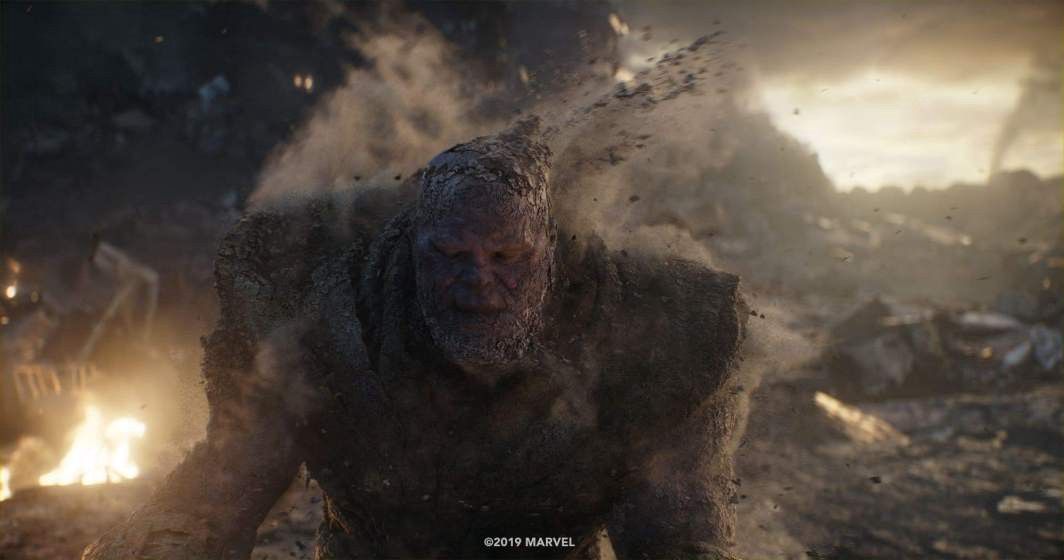
Analysis
I’ll start by saying that this is easily my favorite of the four Avengers films, though I probably should combine it with Avengers: Infinity War, since neither that film nor this one really works independent of the other. Taken together, the Avengers vs. Thanos duology is a grand finale the likes of which rarely comes to theaters.
Of course we will be getting more MCU films; the next one, Spider-Man: Far from Home should be arriving in theaters today. But A vs T is a finale, not just for the story of Thanos pursuing the Infinity Stones that has been simmering in the background of many MCU films, but for the core group of heroes from the original Avengers film: Iron Man, Captain America, Black Widow, the Hulk, Hawkeye, and Thor. Even for those who remain alive, their character arcs seem wrapped up for now. For all of them, this film was an immensely satisfying conclusion.
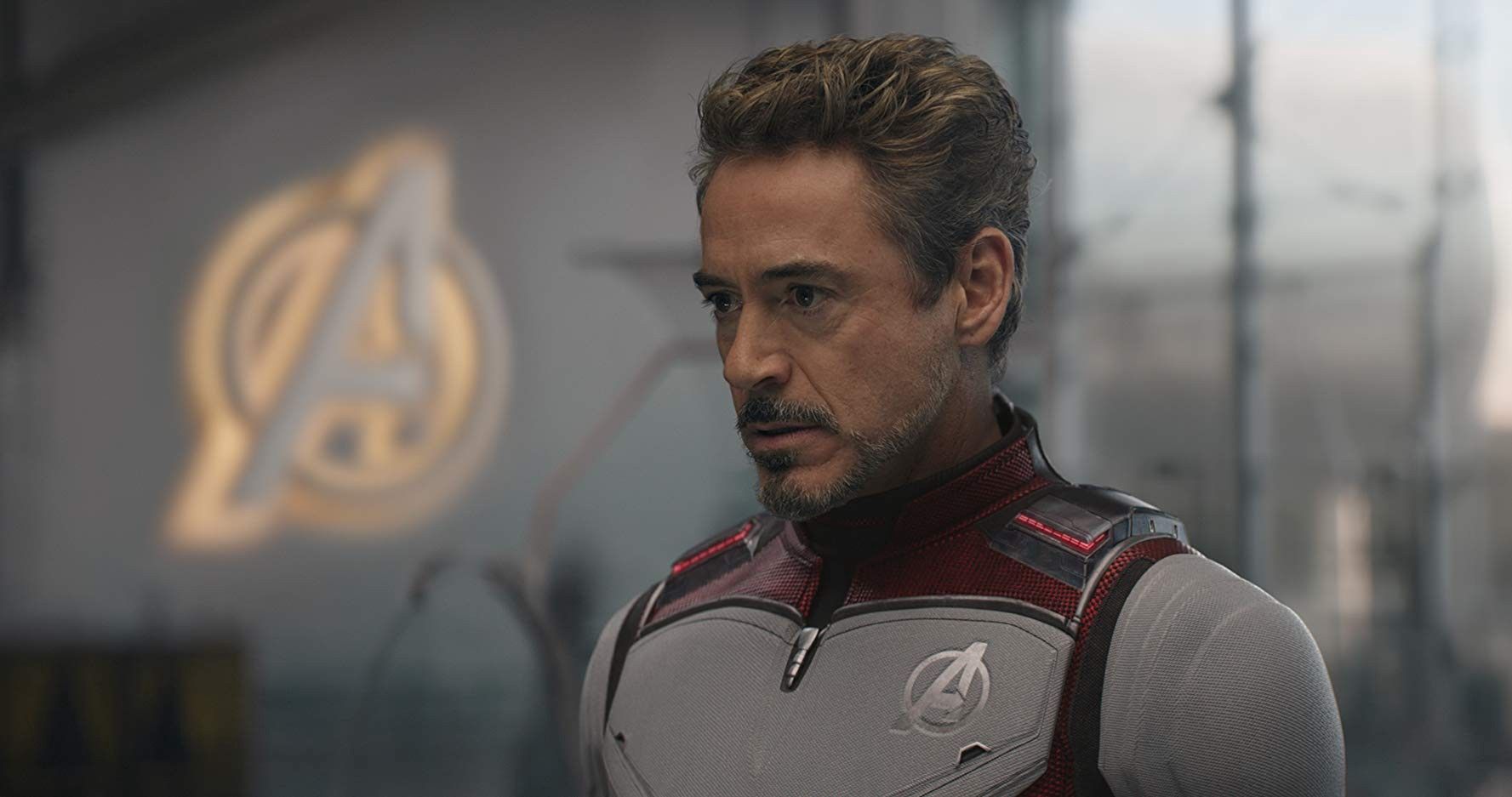
Tony Stark has been the longest-running and most frequently appearing member of the MCU’s main cast, as well as one of the most popular. Even as someone who hasn’t seen Iron Man II or III, I’ve seen Stark in many other films and think he was the clear choice to die defeating Thanos. Not that any of the other Avengers wouldn’t do the same, but the story of Tony Stark is a reflection of the story of humanity, a struggle to overcome selfishness. Stark doesn’t have the innate noble morality of many superheroes; he’s shown, even in this film, to be very proud and not naturally inclined toward self-sacrifice. This is why it means the most to see him take a mortal blow to save the universe, because you know he had to decide to.
Robert Downey, Jr. delivers probably the best performance in the film, due in no small part to the range given to Stark’s character here. Of particular note is the scene wherein Stark reunites with Steve Rogers for the first time since his fight with him in Siberia (at the end of Captain America: Civil War).
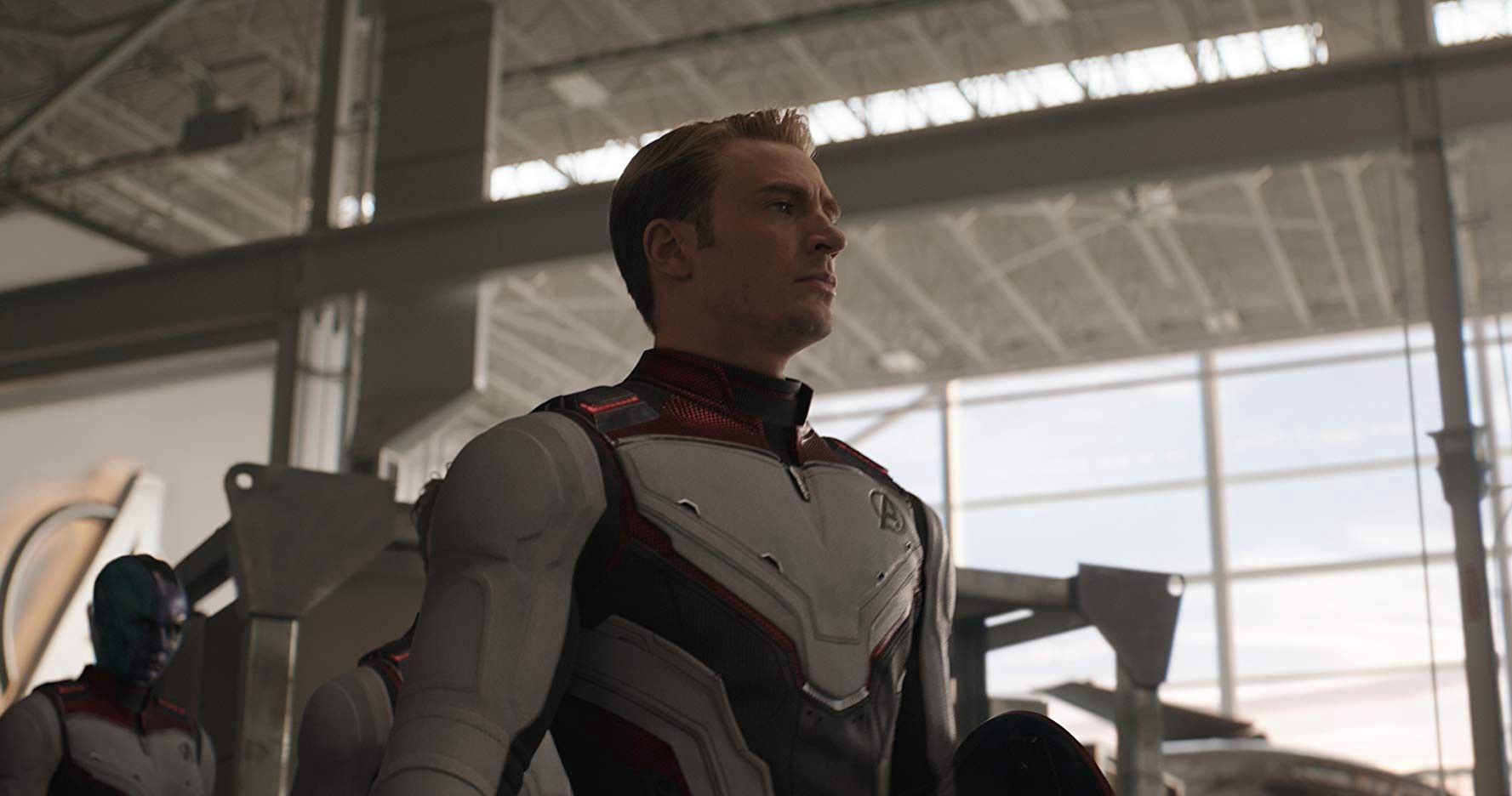
Speaking of, this is also the end of Chris Evans’ career as Captain America. Where Iron Man has been the relatable hero, Captain America has been the aspirational one. Steve Rogers has functioned as the moral center of the Marvel franchise, and while I could see him dying in the battle with Thanos, I’m glad the character got the send-off that he did.
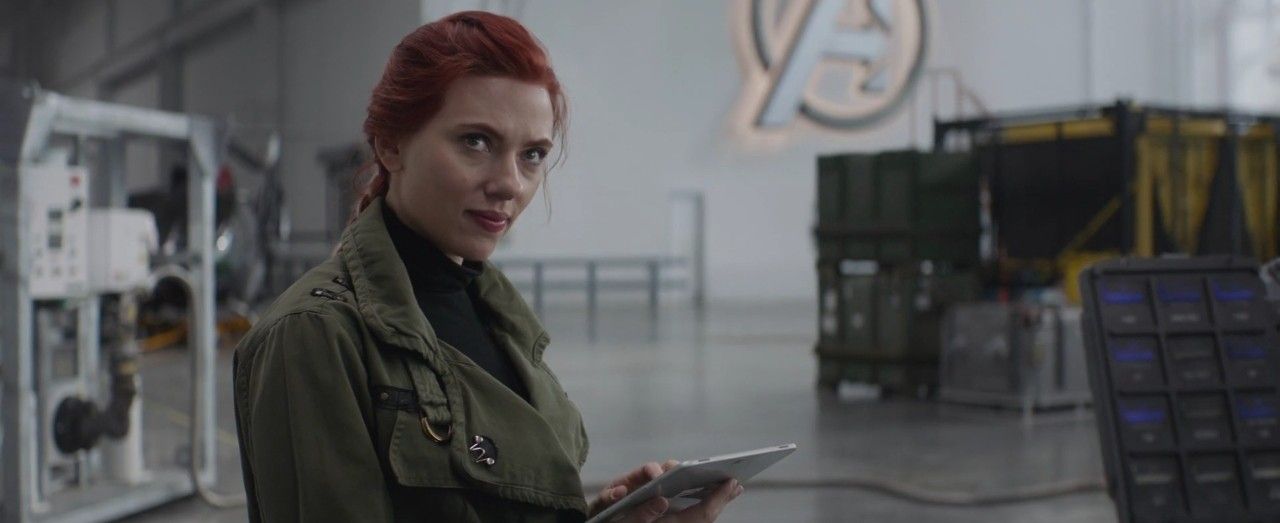
Black Widow is the other main cast character to die in this film, which comes as quite a surprise considering a film centered around the character (now assumed to be a prequel) has been announced for the near future. That said, without knowing about future productions, it kind of makes sense. Widow is, both in and out of universe, the most expendable Avenger, especially considering the changes made to the Hulk.
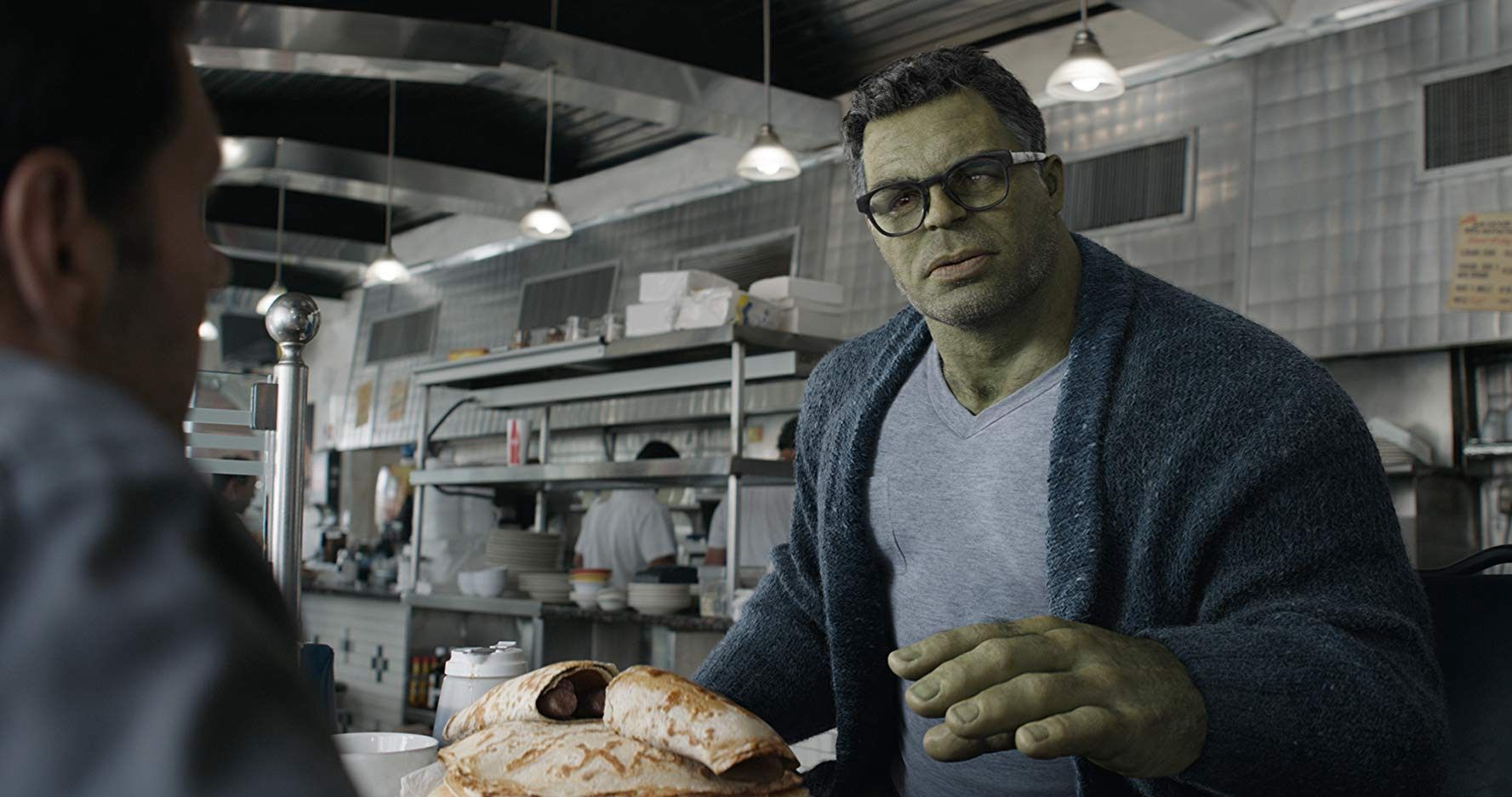
Speaking of, we may or may not see more of the Hulk going forward, as the character’s central conflict seems pretty well resolved. The problem is that it was resolved off-screen. Even though this film almost certainly didn’t have room for it, I feel like we’ve missed something not seeing Hulk and Banner come to terms for ourselves.
Or maybe not. I’ve honestly never found the character all that compelling, not in the MCU or any other media. The premise is there, I suppose, but now even the premise (brilliant scientist or simple-minded giant) has been done away with and replaced with something even less likely to produce compelling drama. Which is fine, if this is meant to be the character’s last appearance. But I’m not sure how much more engaging screentime can be made.
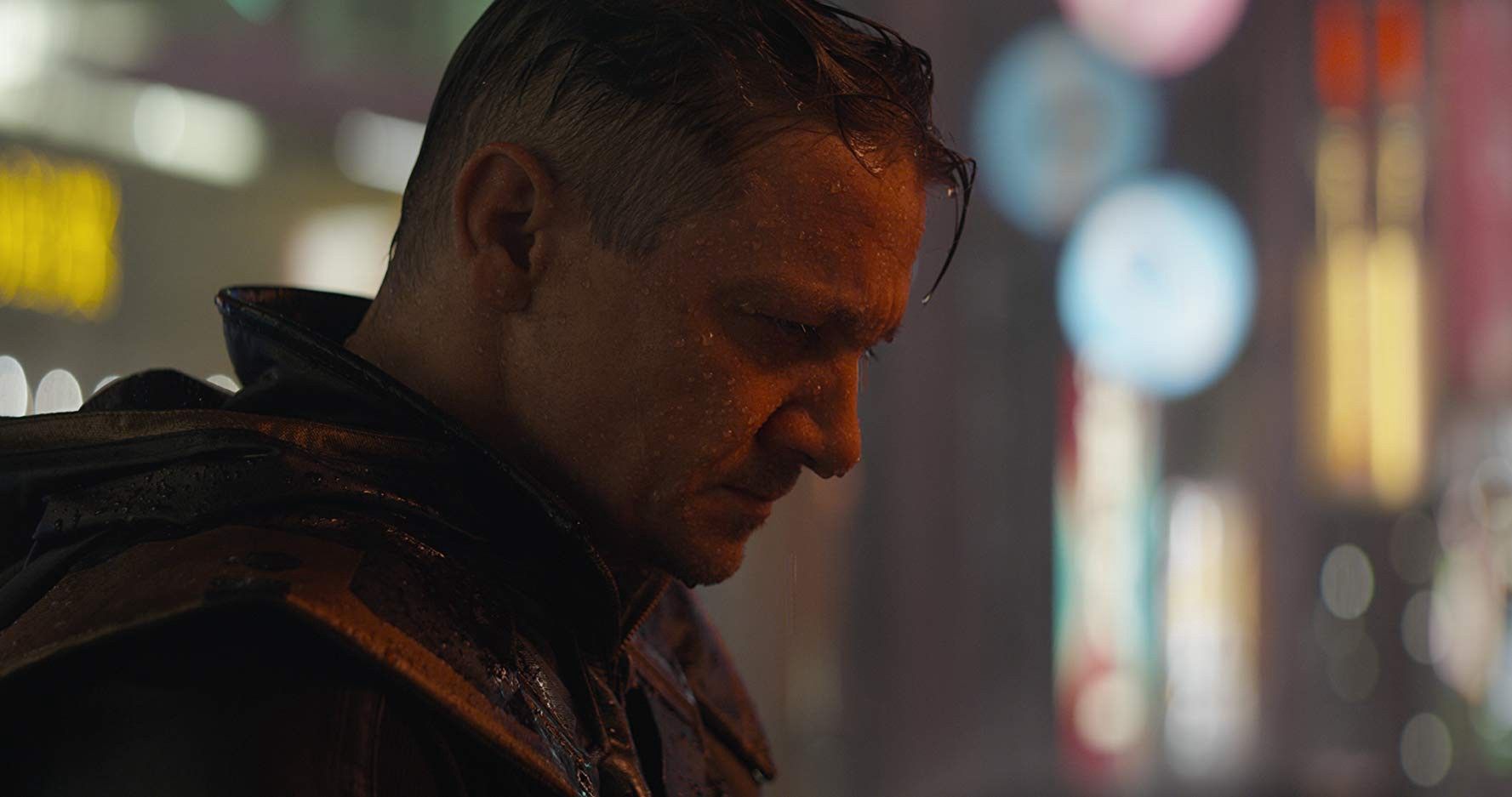
Hawkeye, after being entirely absent in Infinity War, returns here as a sort of ’80s-movie vigilante-with-a-dead-family. There’s something interesting to be done with such a character suddenly having their family returned to them, which might be done in the rumored Disney+ show centered on the character.
In this film, I felt like Hawkeye could have done with some more screen time, though I’m not sure where that would have come from.
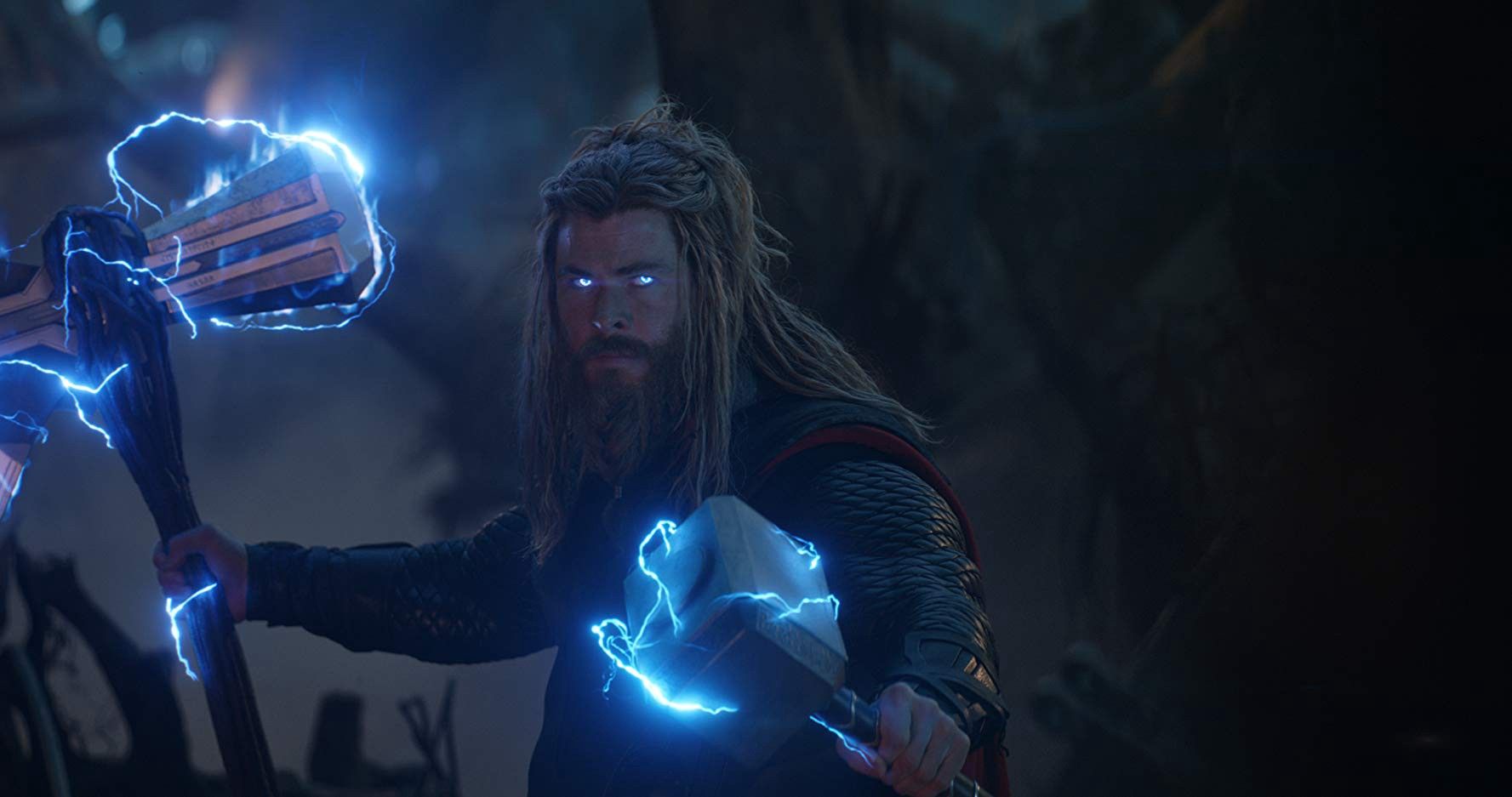
That leaves Thor among the core Avengers left to talk about. Following Thor: Ragnarok, the character has been paired up with the Guardians of the Galaxy for many of his scenes, and, by the end of this film, he has officially joined Quill’s crew. I’m fine with this. It might not be at all true to the character’s antecedent in the comics, or with the original vision for the character as he was first introduced into the MCU, but it works as an arc. In the first Thor, he is told by Odin that he can’t be king until he understands what that would really mean, and now, after coming to understand what being king does really mean, he sees that he still probably shouldn’t be king.
Honestly, even Captain America’s song and dance number from The First Avenger isn’t as American as the MCU’s running theme that monarchy is bad and whatever line of succession scheme you attach to it, it will pick a bad ruler sooner or later. That came up in Black Panther and here it is again.
Now, what I was less fine with was the rather cruel earlier scenes wherein the film looked upon a broken, grieving man and laughed at his pain. I’m not sure that’s what the filmmakers intended to do, but that’s kind of what they did. There’s a reason that town drunk jokes have kind of disappeared in the intervening years between now and The Andy Griffith Show: alchoholism isn’t really a very funny thing to witness. Again, I haven’t seen the Iron Man sequels, but didn’t one of them have something to do with Tony Stark being an alchoholic in response to a hard, violent life? Was that a comic relief sequence there too?
I don’t want to come off as a humorless scold, but I just found these scenes awkward, and I really came to despise Rocket Racoon. Which maybe I’m supposed to, I dunno. I didn’t see his movies.
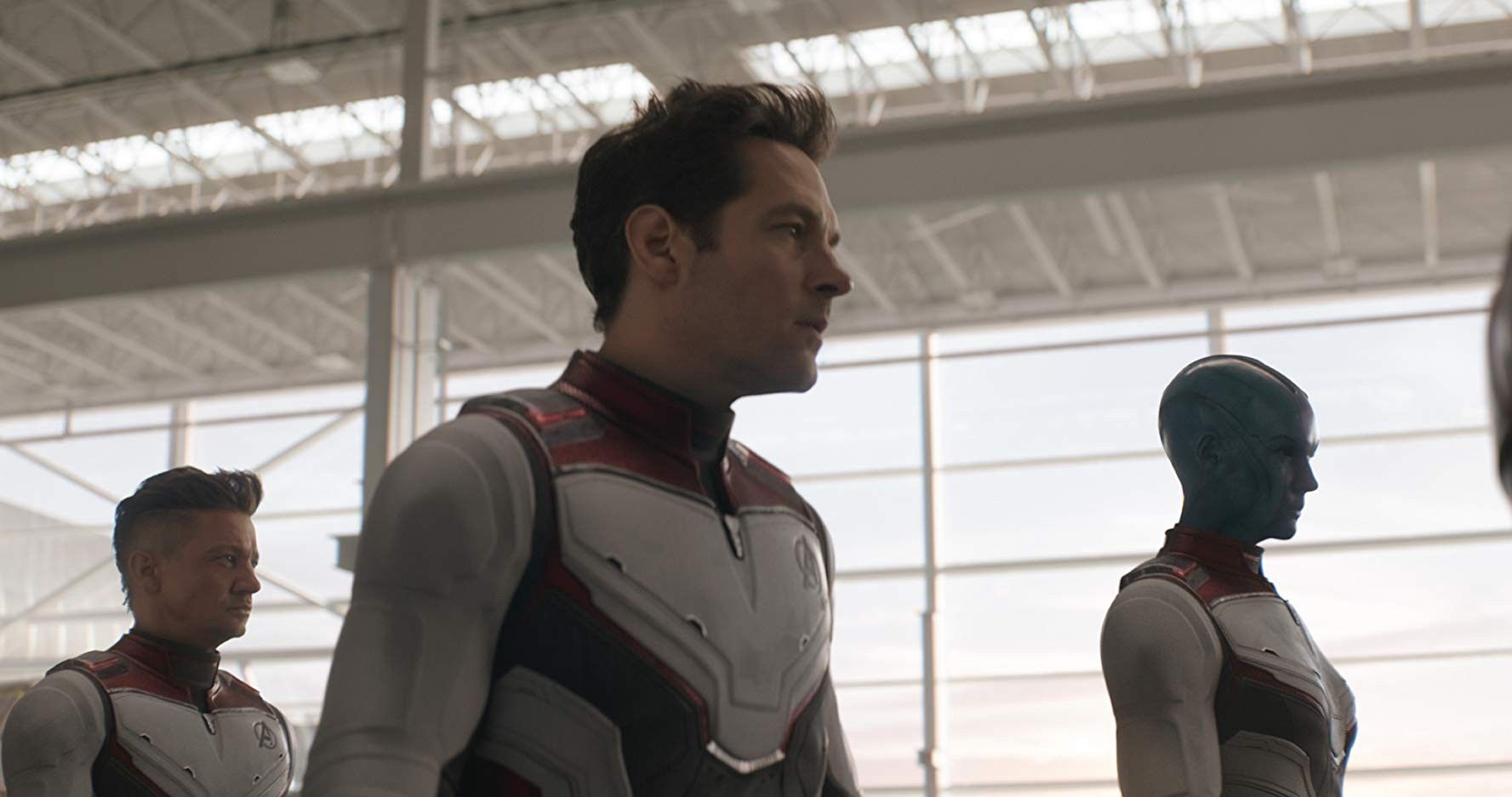
As for the other Avengers, I’m not gonna talk about all of them. Some of them only have a few minutes onscreen, anyway. But I will talk about the more important ones.
The most important is Ant-Man, who brings the idea of travel between timelines to the more capable minds of Banner and Stark. The character was well-used in the early-to-mid parts of the film, fading back a bit once the battle with Thanos got underway. I will say that I missed the level of creativity in using the Pym technology in action scenes that comes in the proper Ant-Man films.
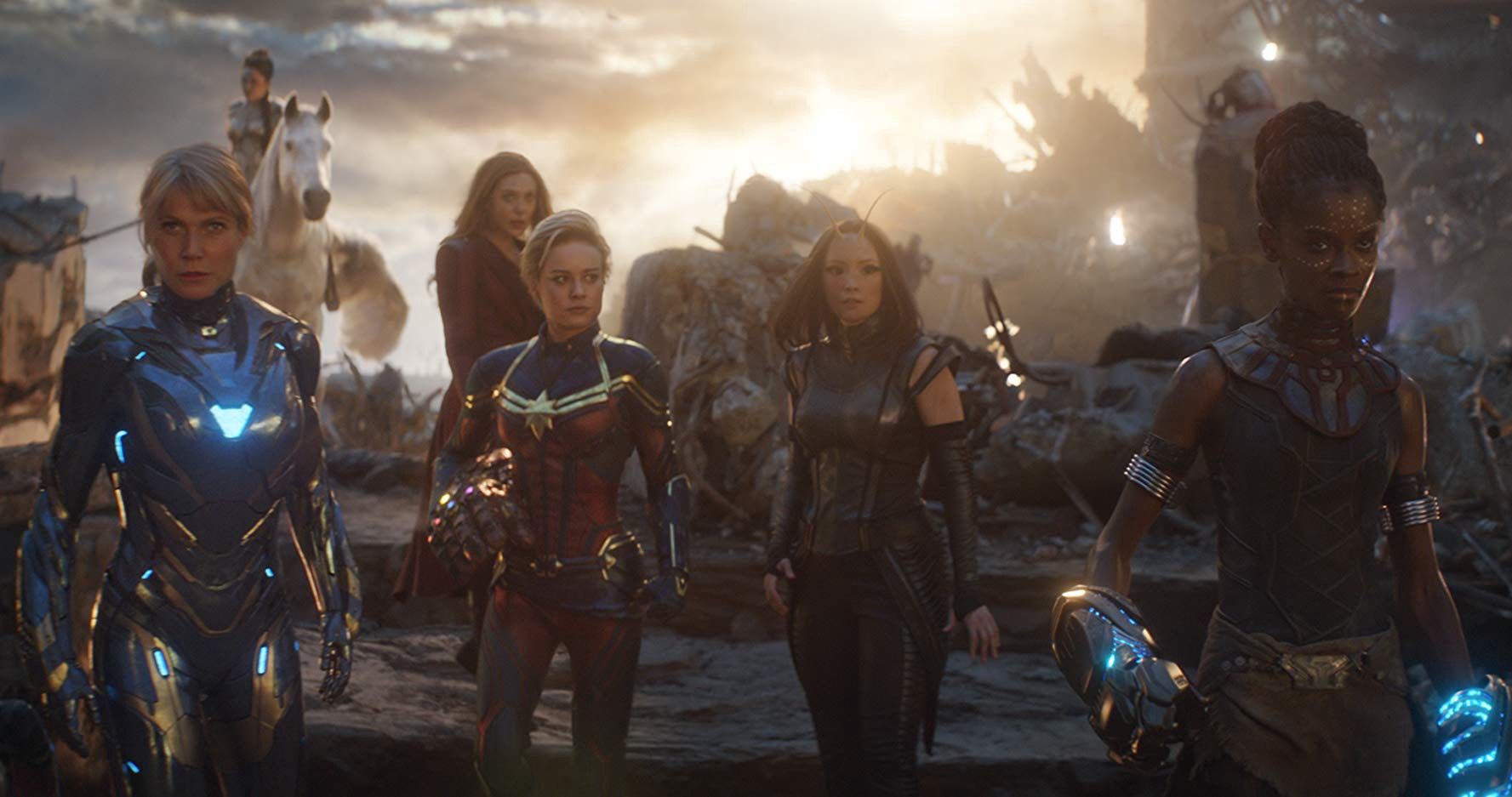
Captain Marvel was, I’m afraid, not particularly well done. She was, as I mentioned I was afraid she would be in my review of her film, treated more as a weapon than as a character. And she wasn’t even used as a weapon as well as I though she might be.
Marvel corporate seems to be hoping that Danvers (who still hasn’t been called Captain Marvel on screen, so far as I noticed) can just exist as “The Girl” in the franchise. But, thankfully, that can’t really happen. Danvers isn’t the girl, she’s one of enough female MCU characters to literally completely crowd the screen. And when that happened in this film, we saw many people who we’d come to love seeing on screen, who we knew as people, and also Carol Danvers.
Honestly, though, I think Danvers was just crowded out by the more established heroes. There wasn’t enough time to give her much to do. In her future appearances I’m still hopeful that the character can be used really well. I’ve heard it suggested many times that in order to function in a story that she’ll have to be de-powered somehow, but I don’t think so. If, by some unfortunate series of boating accidents, fugu cooking mishaps, and mass extinction events it became my job to write the next Captain Marvel film, I’d have her face off against some grand scheming villain who she couldn’t defeat by just punching him into the sky. Kind of how, in the The Dark Knight, Batman can beat the Joker in the interrogation room all day without coming any closer to foiling his plans.
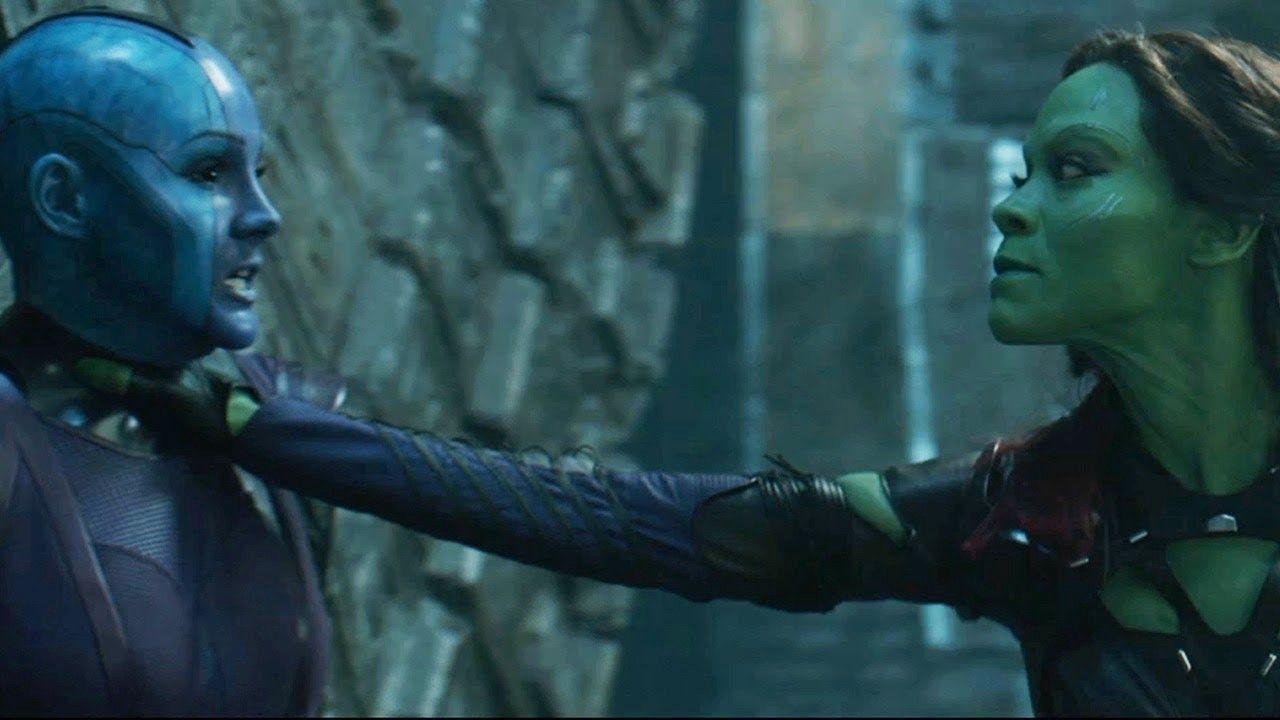
If there’s been anything in these past two Avengers films to make me want to go back and watch the Guardians of the Galaxy films, it’s Nebula and Gamora. These are two very interesting characters with what is clearly a very interesting shared background that I feel I’ve missed out on. Seeing the past Nebula in this film makes me wonder how that character became the present Nebula. Anyway, good performances by Gillan and Saldana.
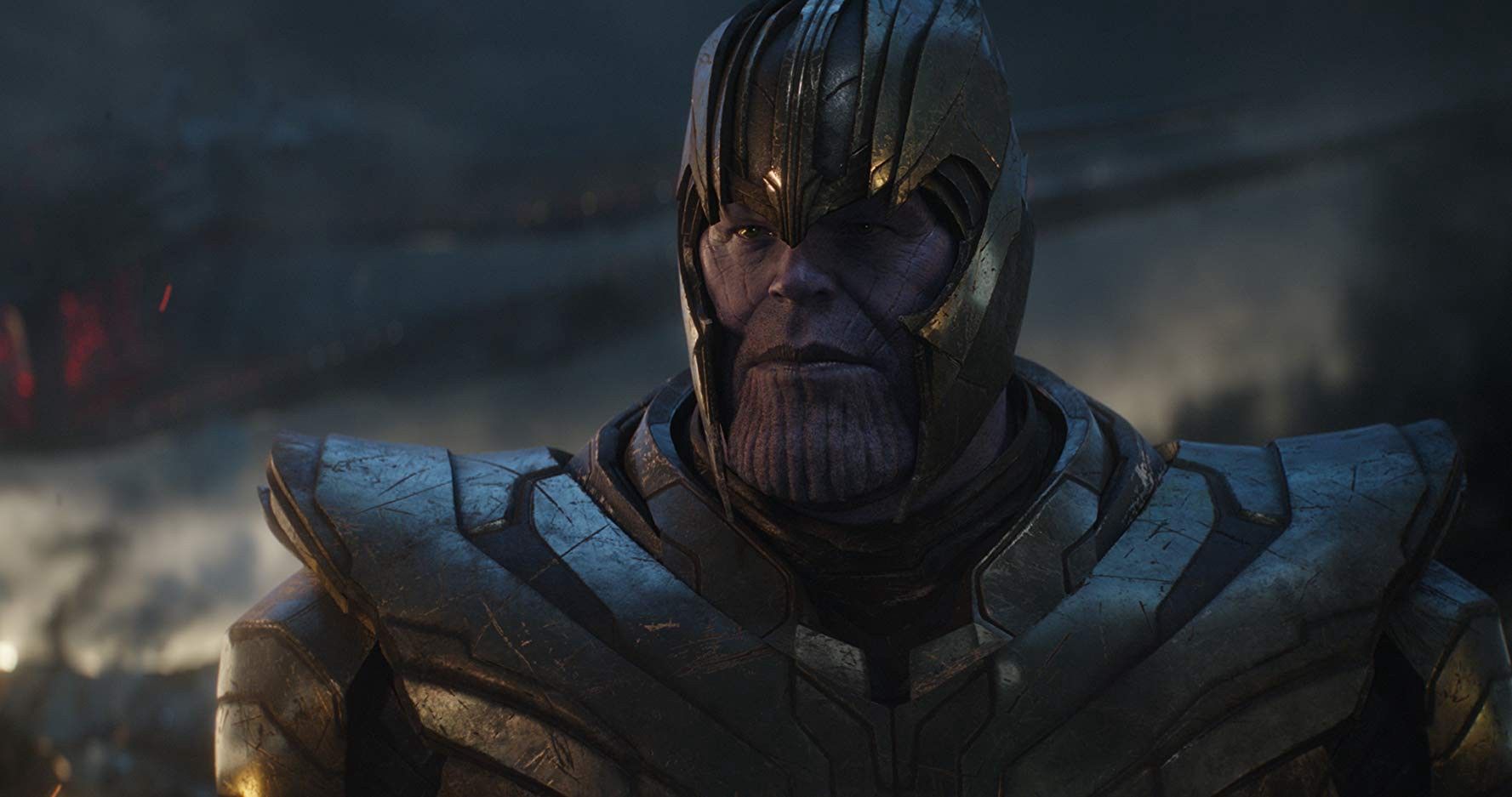
And of course, our villain, Thanos. I spoke about him largely to the exclusion of anything else in my review of Infinity War. He is a memorable villain, that’s to be sure. While he has less screen time in this film than in that one, his shadow is cast over everything, as before. We mostly see a earlier version of Thanos, but he seems to have always been about the same: quite mad. Here we have a character with clearly defined goals and motivations, a clear plan, and, to most people, with clear problems with his plan. Problems you feel like you shouldn’t have to argue against, and that you can’t argue against, really. Thanos is too far removed from basic morals to be reasoned with, which makes him work all the more as the villain in a big to-do like these past two Avengers films. He’s like a force of nature, almost, a perfect zealot with no real selfishness, but who we’d gladly see die horribly all the same.
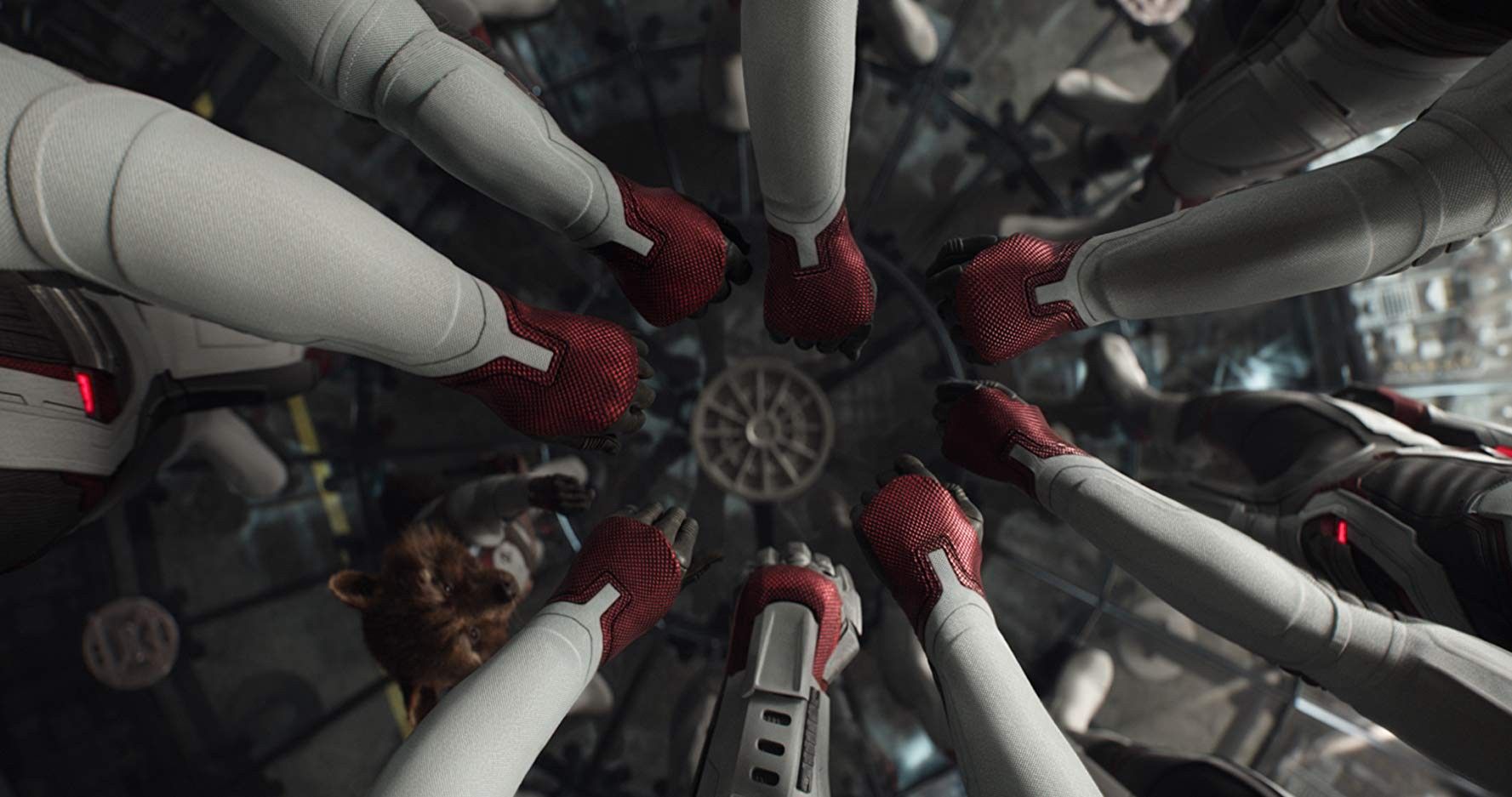
So, this film involves time travel, which is a plot device that can go very wrong in a lot of different ways, especially when introduced to a story’s world later on, as it has been here. And while the actual technology, as explained, lacks the slightest verisimilitude (Silliest moment: Tony Stark sees a holographic light go all the way around a holographic Mobius strip, therefore time travel is possible) that’s not really anything new with MCU tech, particularly that incorporating Pym particles. Thus, the time travel here is going to rise or fall on whether or not it makes narrative sense. I think it generally does, save in one part.
The concept that the Avengers are not traveling to their own pasts, but to parallel timelines playing out earlier events was a clever trick to keep the time travel from seeming like a cheap do-over button. The time travel scenes themselves were all quite entertaining, both those replaying classic scenes of the MCU and those showing new bits of the past. The Ancient One’s insistence that the Stones be returned to when and whence they came was explained well (though it raises the point that there now exist two very different timelines, one in which Thanos abruptly disappears from the galactic scene, and one in which Loki succeeds in claiming the Tesseract. I trust that Marvel has plans for both of these.)
The one part I think the whole time travel thing doesn’t work as explained is at the very end, when an aged Steve Rogers appears by the lake. As established, Rogers would not have gone to the actual past, but an alternate timeline, and thus could not have returned to the present by waiting out the years. But there’s probably a perfectly good explanation involving a second time machine bringing Rogers back to the original timeline in such a way it only appeared he had been waiting, or something, that wouldn’t have fit in the movie. Or maybe I’m still not understanding how the time machine works. I dunno.
What I can say is that, while the film is playing out, the time travel works narratively. I could find some problems with the logic of it, but that was only after looking, for the purposes of the review. I was not confused while watching, and I don’t think you will be either.
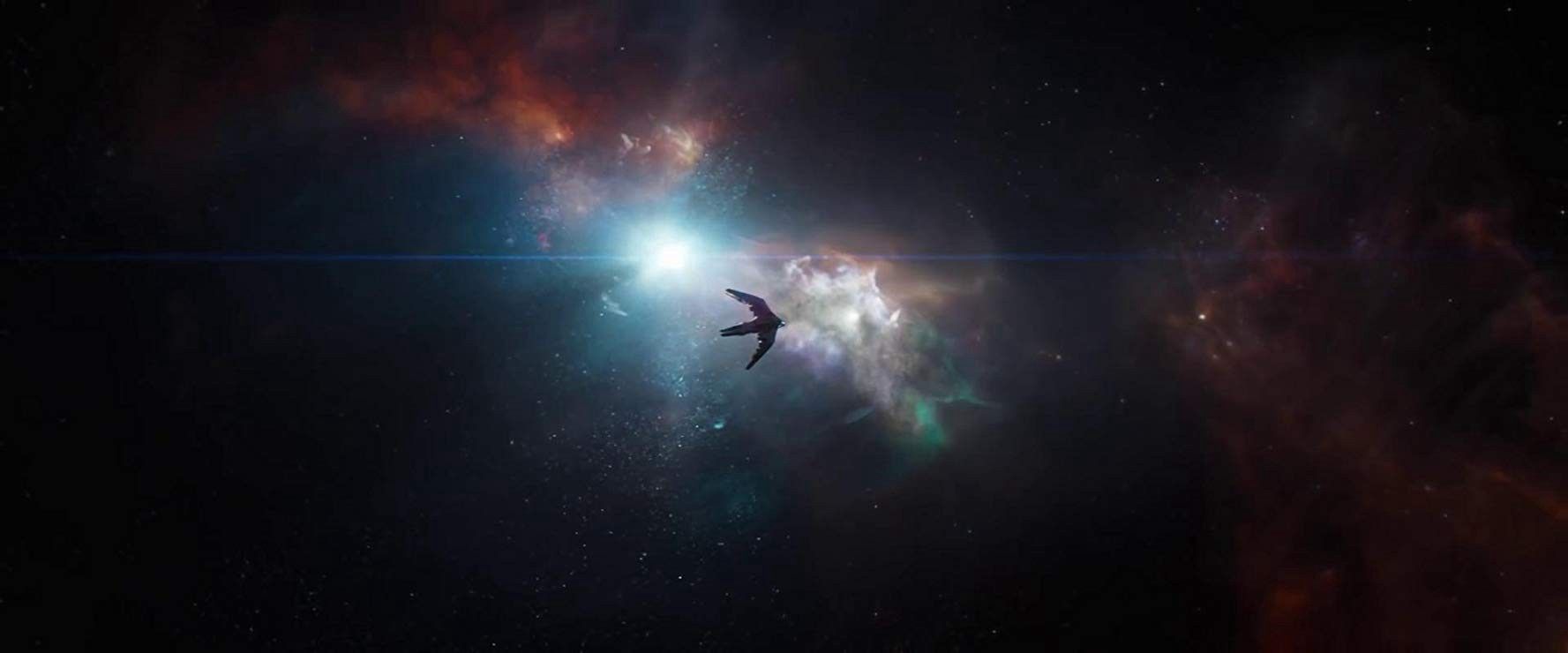
The score is Alan Silvestri again. It carries us through scenes well, punctuating appropriate moments with a few bars of a character theme or a quick E-E-B-A-G-F#-E. You’ll notice that the soundtrack album isn’t as long as the film is. There are quite a few scenes without music; important scenes play out entirely in dialogue.
The action was good. Even the big CGI battle climax was good, much better than the similar battle at the climax of Infinity War. I’m not quite sure I can explain why. Maybe it’s the way it just starts out of no where, with Thanos gaining the upper hand early on and keeping it until a grand tide turn, where A:IW delayed the battle’s beginning a good while until the heroes decided they were ready to fight and had two or three tide turns. Or maybe it’s the dusty ruins, rather than the sunny field, giving a bit more of a moody atmosphere.
Altogether, this film does a good job conveying an epic scale without making things overwhelming. It’s sort of the opposite of Avengers: Age of Ultron in that way. The stakes here are the entire universe, but they are also more personal things. The Avengers stand to lose loved ones, and many already have. The film focuses on this, not to make the characters seem only concerned with their immediate personal affairs, but to keep things grounded. It works.
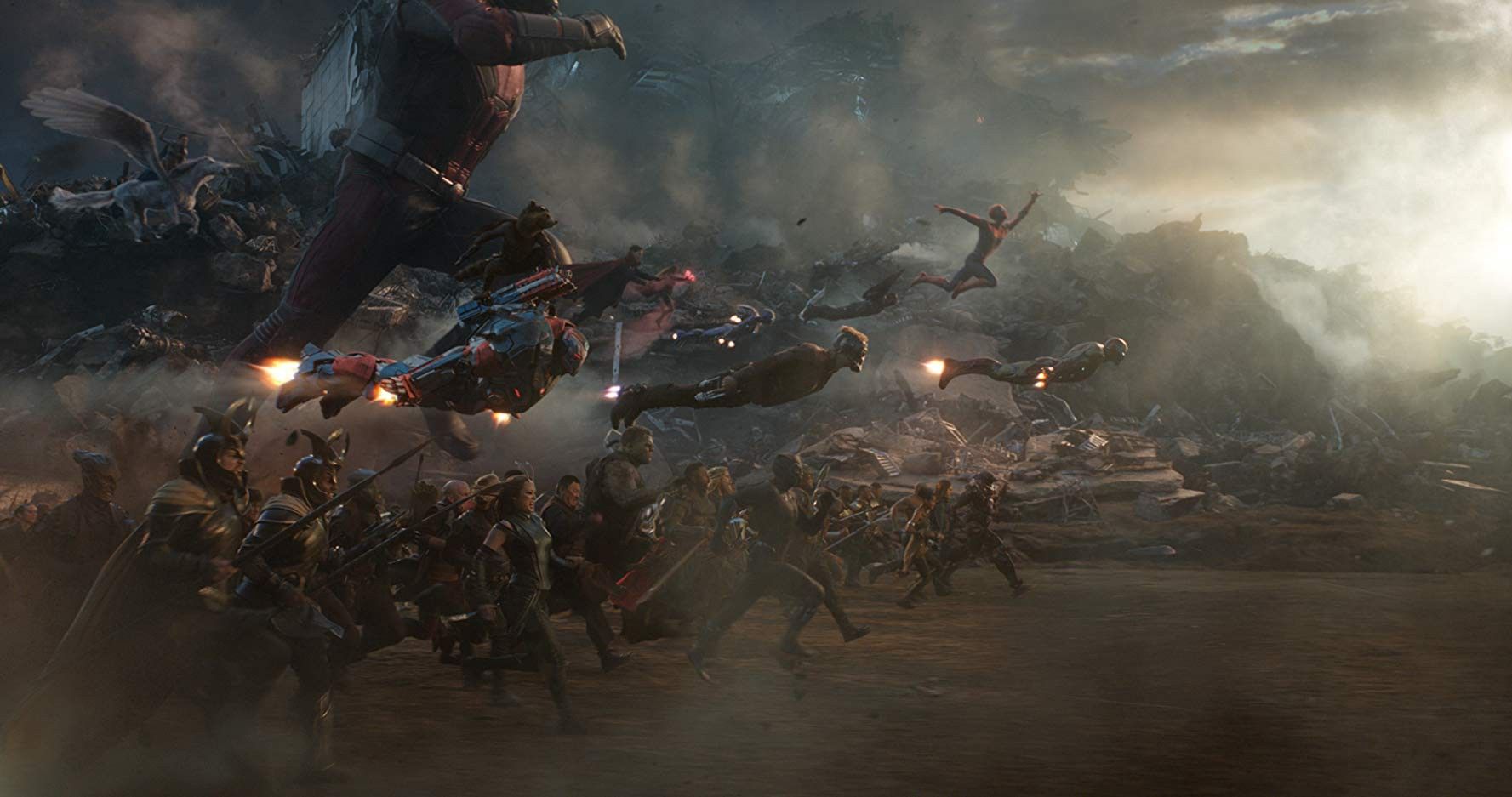
Recommendation and Rating
You’ve almost certainly seen this film already if you have any interest in the MCU. If you haven’t, it’s been re-released with a bit of deleted scenes tucked into the credits, so you’ll get a bit more than I did.
If you aren’t interested in the MCU, I’d say don’t go see this. If you’ve been turned off from superhero films by the offerings of the late ’90s and 2000s, I will say that the MCU are genuinely pretty good films, not just special effects extravaganzas but also interesting character dramas with good story flow between installments and, usually, some good comedy on top of it all. But don’t start with this film. Think of Avengers: Endgame as the second episode of a two-part season finale of a television show. Watching it before you’ve seen at least the preceding episode will leave you really lost.
But if you have seen the lead-up, I’m sure you’ll agree that this film really works as a big finale
As for the score, I’m going to give this film combined with Infinity War a combined numerical rating. Some slow, pointless bits in A:IW and the tasteless Thor scenes here are going to cost a point, but that still leaves a total of
8/10 — Without significant negative worth. Able to be recommended, at full price, without reservation



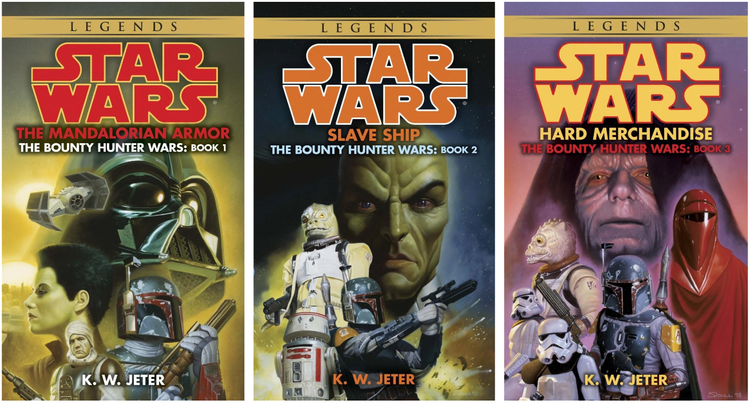

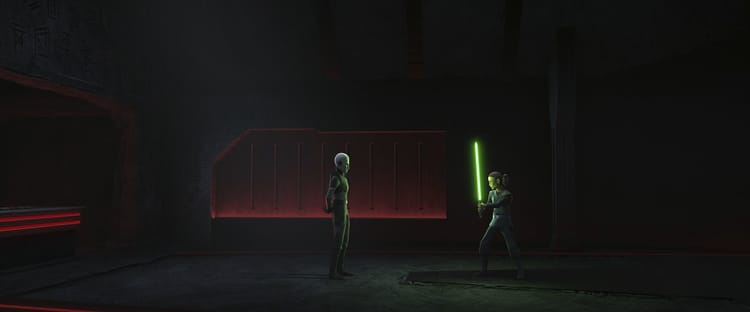
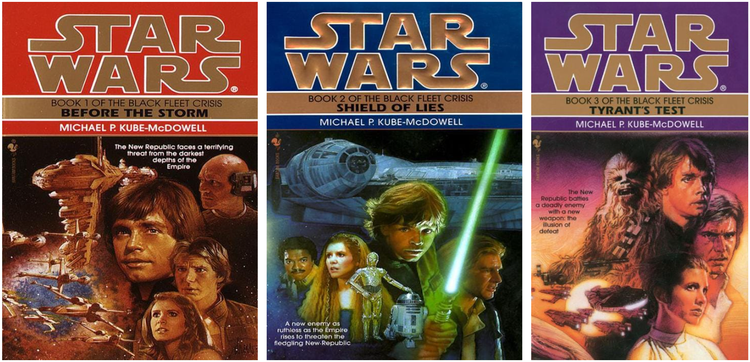
Member Commentary